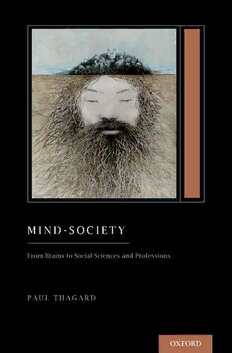
Mind-Society: From Brains to Social Sciences and Professions (Treatise on Mind and Society) (Oxford Series on Cognitive Models and Architectures) PDF
Preview Mind-Society: From Brains to Social Sciences and Professions (Treatise on Mind and Society) (Oxford Series on Cognitive Models and Architectures)
i Mind–S ociety ii OXFORD SERIES ON COGNITIVE MODELS AND ARCHITECTURES Series Editor Frank E. Ritter Series Board Rich Carlson Gary Cottrell Robert L. Goldstone Eva Hudlicka William G. Kennedy Pat Langley Robert St. Amant Integrated Models of Cognitive Systems Edited by Wayne D. Gray In Order to Learn: How the Sequence of Topics Influences Learning Edited by Frank E. Ritter, Joseph Nerb, Erno Lehtinen, and Timothy O’Shea How Can the Human Mind Occur in the Physical Universe? By John R. Anderson Principles of Synthetic Intelligence PSI: An Architecture of Motivated Cognition By Joscha Bach The Multitasking Mind By David D. Salvucci and Niels A. Taatgen How to Build a Brain: A Neural Architecture for Biological Cognition By Chris Eliasmith Minding Norms: Mechanisms and Dynamics of Social Order in Agent Societies Edited by Rosaria Conte, Giulia Andrighetto, and Marco Campennì Social Emotions in Nature and Artifact Edited by Jonathan Gratch and Stacy Marsella Anatomy of the Mind: Exploring Psychological Mechanisms and Processes with the Clarion Cognitive Architecture By Ron Sun Exploring Robotic Minds: Actions, Symbols, and Consciousness as Self- Organizing Dynamic Phenomena By Jun Tani Brain– Mind: From Neurons to Consciousness and Creativity By Paul Thagard Mind– Society: From Brains to Social Sciences and Professions By Paul Thagard Natural Philosophy: From Social Brains to Knowledge, Reality, Morality, and Beauty By Paul Thagard iii Mind– Society From Brains to social sciences and Pro Fessions Paul Thagard 1 iv 1 Oxford University Press is a department of the University of Oxford. It furthers the University’s objective of excellence in research, scholarship, and education by publishing worldwide. Oxford is a registered trade mark of Oxford University Press in the UK and certain other countries. Published in the United States of America by Oxford University Press 198 Madison Avenue, New York, NY 10016, United States of America. © Oxford University Press 2019 All rights reserved. No part of this publication may be reproduced, stored in a retrieval system, or transmitted, in any form or by any means, without the prior permission in writing of Oxford University Press, or as expressly permitted by law, by license, or under terms agreed with the appropriate reproduction rights organization. Inquiries concerning reproduction outside the scope of the above should be sent to the Rights Department, Oxford University Press, at the address above. You must not circulate this work in any other form and you must impose this same condition on any acquirer. Library of Congress Cataloging-in-Publication Data Names: Thagard, Paul, author. Title: Mind-society : from brains to social sciences and professions / Paul Thagard. Description: New York, NY : Oxford University Press, [2019] | Includes bibliographical references and index. Identifiers: LCCN 2018033235 | ISBN 9780190678722 Subjects: LCSH: Social sciences and psychology. | Cognitive neuroscience. Classification: LCC BF57. T534 2019 | DDC 150—dc23 LC record available at https://lccn.loc.gov/2018033235 9 8 7 6 5 4 3 2 1 Printed by Sheridan Books, Inc., United States of America v To John Holmes and Bob McCauley, good friends and social minds. vi vii Contents List of Illustrations xiii Foreword xv Preface xix Acknowledgments xxi Part I | Mechanisms 1. Explaining Social Change 3 Social Change 3 Explanatory Styles 6 Mental, Neural, and Social Mechanisms 9 Emergence 11 The Social Cognitive- Emotional Workup 15 Applications 16 Summary and Discussion 19 Notes 20 Project 21 2. Mental Mechanisms 22 Cognition and Emotion 22 Brains and Semantic Pointers 23 Images 27 Concepts 29 Beliefs 31 Rules 32 Analogies 34 Emotions 35 vii viii viii Contents Mapping Values 37 Inference and Coherence 40 Emotion- Driven Inferences 42 Summary and Discussion 43 Notes 46 Project 47 3. Social Mechanisms 48 Social Mechanisms and Communication 48 What Are Social Mechanisms? 51 Structural Connections 54 Social Interactions 55 Verbal Communication 57 Nonverbal Communication 59 Interagent Inference 61 Social Mechanisms for Spreading Emotions 62 Multilevel Explanations 65 Change and Emergence 67 Summary and Discussion 70 Notes 74 Project 75 Part II | Social Sciences 4. Social Psychology: Romantic Relationships 79 Relationships Matter 79 Social Cognition and Microsociology 80 Mechanisms in Relationships 81 Murray and Holmes on Interdependent Minds 82 Romantic Relationships: Social Cognitive- Emotional Workup 83 Trust and Commitment 92 Love 94 Romantic Interactions 96 Contrast with Gottman 98 Relationship Success and Failure 100 Does the Heart Want What It Wants? 102 Summary and Discussion 103 Notes 105 Project 106 ix Contents ix 5. Sociology: Prejudice and Discrimination 107 Discrimination and Prejudice 107 Stereotypes 109 Women: Social Cognitive- Emotional Workup 110 Jews: Social Cognitive- Emotional Workup 117 Social Norms and Institutions 123 Overcoming Prejudice 127 Conceptual Change 131 Summary and Discussion 133 Notes 135 Project 136 6. Politics: Ideology 137 Political Change 137 Political Mechanisms 138 Ideology: Three- Analysis 139 Ideology: Value Maps 141 Ideological Change 142 The Islamic State: Social Cognitive- Emotional Workup 144 Power 164 Summary and Discussion 167 Notes 170 Project 172 7. Economics: Bubbles and Crashes 173 Beyond Animal Spirits 173 Economic Decisions 175 Booms and Bubbles: Social Cognitive- Emotional Workup 178 Panics and Crashes: Social Cognitive- Emotional Workup 188 Mindful Economics 193 Reflexivity 196 Summary and Discussion 197 Notes 199 Project 200 8. Anthropology: Religion 201 Cultures 201 Religion 202 The Latter-D ay Saint Religion: Social Cognitive- Emotional Workup 204
